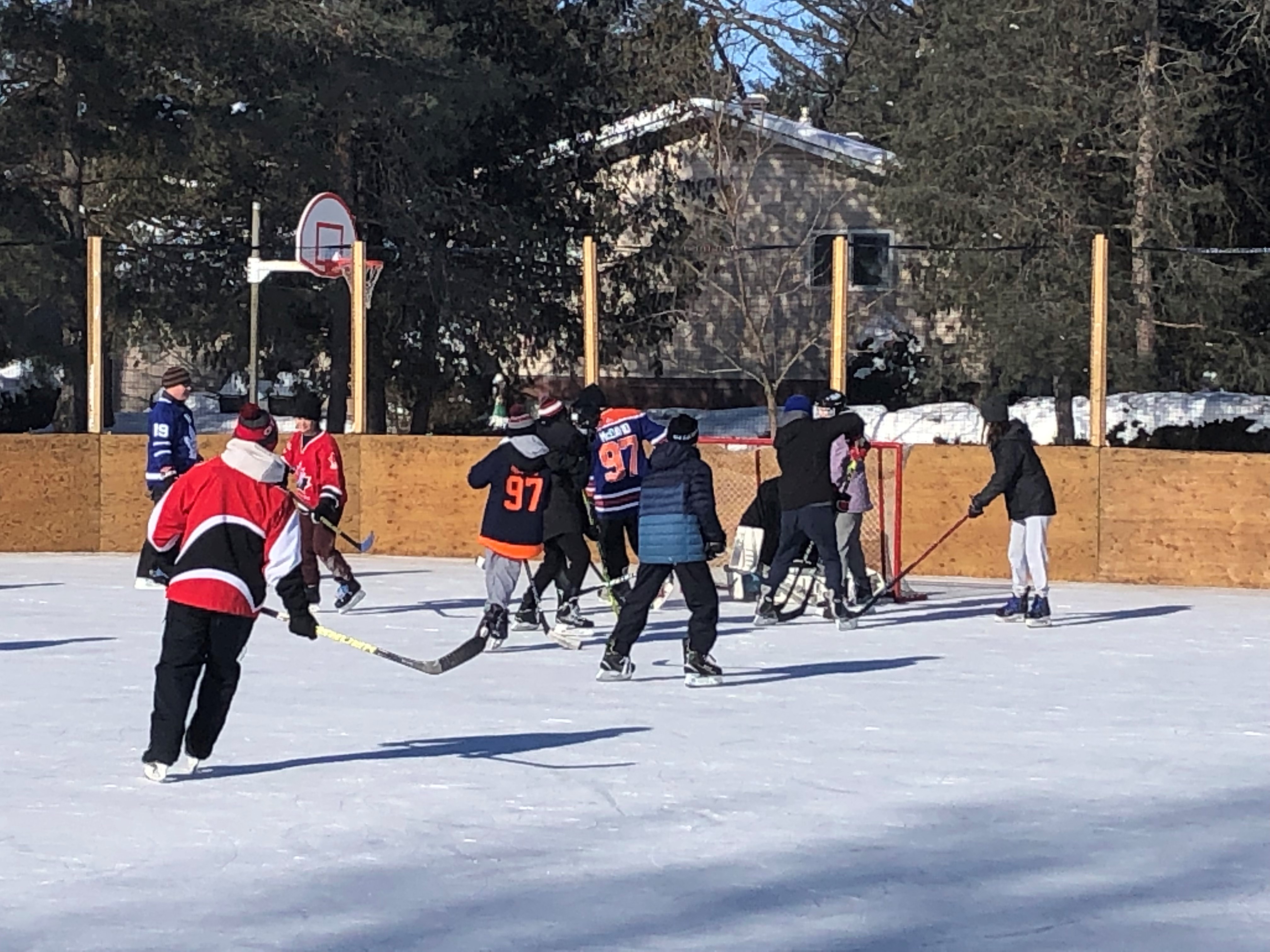This interview with Al Arseneault (Lakeview ODR, Ottawa) is part of our 'Keep the Game We Love Going ODR Contest.' Show us how you're enjoying outdoor rinks, wherever you enjoy skating and get your entry featured on our contest submission page. Click here to learn how you could assist your community ODR for next season with $1,000.
You’ve been looking after an outdoor rink for 32 years – what has kept you involved for so long?
I was born and raised in Smooth Rock Falls, Northern Ontario. Growing up, I had a buddy whose dad would build an ODR and we played on that almost every night. I have such fond memories of those winters, playing hockey on that outdoor rink.
In February 1989, we were house hunting in Ottawa and I noticed that the house we were looking to buy backed on to Lakeview Park. I could see the ODR through the sliding doors. I knew right then and there that I had to buy this house. At that time, I had two young children and I wanted them to experience the same thrills of skating and playing hockey on an ODR as I did growing up. As it turned out, the previous owner of this house looked after Lakeview ODR for 20 years and he asked me to take it over. I did so, thinking I would do it until my kids grew older and lost interest. They did grow older and my daughter and her family now live in New Jersey. But my son and his family live one street over from the ODR and he still loves to play shinny on it. My wife Betty has also been running a home daycare for as many years as we have operated the ODR and she has taught countless numbers of children how to skate on that ODR. She’s a strong believer in getting kids away from TV monitors and video games, to play outdoors. I also see the benefit of what having this ODR means to our community and it gives me an opportunity to give back. In addition, it gives me plenty of exercise over the winter months.
Now that I’m nearing 66, I’ve started wondering about my physical ability to continue maintaining the ODR and possibly having to give it up. For the past 3-4 years, I have been ably assisted by one of my neighbours, with the understanding that he would someday, take over the maintenance of Lakeview ODR. But for the time being, I have two young grandchildren who love to skate on “Papa’s rink”. My 6 year old grandson, in particular, can’t wait to come to our house after school, eat a quick snack, and head out to the rink to play hockey with the other neighbourhood kids. I guess I have to keep going for a while now, or at least until I am no longer physically able to.

"The young lad with the red jersey and blue hood is my grandson."
What are your top tips for creating and maintaining outdoor rinks?
Many of the backyard rinks that we hear about involve the use of solid tarps that help retain the water. But we don’t have that option when maintaining a large surface area such as a community ODR. When starting the base ice, the first decision the operator has to make is to decide if he/she wants to flood directly over the frozen ground or use a packed snow base. I believe strongly in flooding over an 8-12cm packed snow base whenever possible. It allows you to use the snow to help level off your surface and once that snow base is saturated and frozen, it gives you a solid slab of ice that can help withstand future mild spells. It takes me 10-12 floods to finish my base. I like to use thin layers each flood, to allow the water to freeze before it seeps out under the boards or snow banks.
Once the base is complete and the ODR is in maintenance mode, I try and flood every day, providing it’s not snowing, too mild (warmer than -5C), or too cold (colder than -20C). There’s a popular misconception that extremely cold weather is beneficial for the ODR. That is somewhat true during the process of building base ice but once you are in daily maintenance mode, I try and avoid flooding if the temperatures go below -20C. The water freezes to quickly in waves and it is much more brittle. There’s also a high risk of freezing hoses (or freezing the person holding the hoseJ).
Whenever I’m doing a maintenance flood, I try and apply a thin layer of water. Thinner layers seem to produce harder ice that can withstand more use. We use custom made metal scrapers to clean off as much snow as possible before flooding. I also make it a point to take an extra 20 minutes to use a straw broom and sweep out any snow that gets trapped along the edge where the ice meets the boards. This prevents ice buildup along the boards. It also prevents pucks from “flying up” and possibly injuring someone.
Check out this video produced by the City of Ottawa's Seasonal Recreation Department (2021). Over the past ten years, Al has been making presentations on behalf of the City and due to COVID, they made this video to share.
You can also check out 'The Rink Guys' video (2016) profiling three Ottawa community rink builders.
What are your ideal weather conditions for a perfect winter skate?
If I could order up a custom winter forecast, I would be asking for partly sunny/cloudy days with daytime highs of -5C to -8C, and overnight lows of -10C to -15C. For the skaters, it makes it pleasant to be outside and for ice maintenance, it allows for perfect flooding temperatures where the water has time to melt any residual snow and spread out evenly before freezing. Skiers won’t like to hear me say this but once I have established base ice, I would be happy not to see another snow flake for the remainder of the ODR season.
Volunteers are integral to keeping ODR’s running. What advice would you share for volunteers looking to get involved?
For the most part, when the general public thinks of what is involved in maintaining an outdoor rink, they have a vision of someone who is standing over an ice surface, holding a hose and flooding. But the actual flooding process only constitutes about 20% of the total work involved. The remaining 80% of the work relates to snow removal, including snow blowing, shoveling and scraping. Whenever I have someone come to me offering to volunteer, I try and explain this reality. When I hear someone say “if you ever need help, give me a call”, I respond by saying: “when it snows, come out to the rink and help out with the snow removal”.
At the same time, I try explain to volunteers how much of a rewarding experience it is to see the positive results of their labour, to witness the joy in childrens’ faces and hear their laughter. To experience parents’ gratitude for their service and to see the overall health and social benefits the ODR brings to local communities.
In Ottawa, high school kids are required to perform a number of volunteer hours as part of their curriculum. I take advantage of this to recruit kids who love the ODR and they learn the benefits of community involvement.
Do you have a favourite memory in all your years being involved in ODRs?
I have many fond memories over the years but without a doubt, my favourite and most memorable event occurred in 2016 when my wife Betty and I, along with our family, were invited to city hall to receive the mayor’s City Builder Award “in recognition of outstanding community service and civic dedication to improving the quality of life of the citizens of Ottawa”. In addition to our involvement in operating and maintaining the ODR, we were also recognized for the many years we have volunteered to organize and host our community outdoor curling bonspiels. This award is proudly displayed in our home.
Another memory that comes to mind involves the Florida Panthers of the NHL. The Panthers were in town to play the Senators. They had a couple of days to layover afterwards, while awaiting to play the Canadians so they contacted the city and asked them to recommend an ODR where the team could have an informal practice and have some relaxed fun playing the game they loved on outdoor ice. I’m proud to say that the city recommended Lakeview ODR. As fate would have it, the team’s coach was very disappointed with the Panthers’ performance and loss to the Senators and decided at the last minute, to cancel the ODR practice. So it may not be a fond memory but one I won’t forget.
What does your ODR mean to the community?
As mentioned previously, having an ODR brings tremendous health and social benefits to a community. It brings families and other citizens together, by providing an essential service, particularly during these past two years under covid-19 restrictions. People are looking for outlets to get outdoors for some exercise and fresh air in a safe environment and the ODR is a perfect option. Physical outdoor activity and fresh air is such an important aspect of overall health. Apart from the game of hockey being recognized as the number one Canadian pastime, the outdoor curling bonspiels that we’ve been hosting for ten plus years have become a focal event in the community of Crystal Beach/Lakeview. Inhabitants frequently thank us for maintaining the ODR and its related activities.


